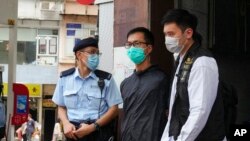After a sweeping crackdown on pro-democracy opposition in Hong Kong that has seen dozens of activists arrested and jailed, authorities have firmly turned their attention to the city's civil society groups.
In recent months, several of Hong Kong’s prominent opposition groups have disbanded as repressive measures mount in the city.
Following 2019’s anti-government protests, Beijing implemented sweeping national security legislation prohibiting acts such as secession, subversion and collusion with foreign forces. Hong Kong’s pro-democracy movement has been stifled as street protests have stopped and political speech Beijing finds offensive have been banned.
Since the security law came into force last year, at least 50 civil society groups have folded, Agence France-Presse reports.
Oct. 1 marked the 72nd anniversary of the Peoples Republic of China, a public holiday and a day of national celebrations in China. But in Hong Kong, pro-democracy campaigners have historically used the day to launch street protests and call for political reforms. This year, only a handful of protesters gathered on the streets and were stopped by authorities. Reports say up to 8,000 police officers were on standby throughout the day.
In previous years, China’s National Day would keep Hong Kong's civil society groups busy.
The Civil Human Rights Front, founded in 2002, was responsible for Hong Kong’s largest-ever protest that attracted nearly 2 million people in June 2019. The group would usually organize demonstrations for important dates on the city’s political calendar. But the organization disbanded in August after it was accused of violating Hong Kong's national security law.
The Hong Kong Alliance in Support of Patriotic Democratic Movements of China was once responsible for organizing Hong Kong’s June 4 annual candlelight vigil in memory of the Tiananmen Square crackdown in Beijing in 1989, an event that usually attracted thousands.
But the alliance folded in September, ending 32 years of activism, when three leaders were jailed, facing a number of charges, including inciting secession.
Political analyst Joseph Cheng, formerly of Hong Kong but now based in New Zealand, praised the group but admitted there is “no room for survival” for Hong Kong’s opposition groups anymore.
“The alliance has probably more symbolic value in that its formation in 1989 led to the formation of pro-democracy parties immediately afterwards. Its continued operation after (Hong Kong’s handover from Britain to China in) 1997 was perceived to be the symbol of tolerance of the 'one country, two systems' model,” he told VOA.
Hang Tung-chow, the former vice chairperson for the Hong Kong alliance and one of the three leaders now in jail, told VOA in August that opposition groups could still survive in the city, at least informally.
“I think there will likely be more decentralized groupings, connection platforms, that might have difficulties seeing very open public organization and events. But under the surface, underground, there will still be a connection there and organizations going on,” she said.
Eric Yan-ho Lai, author of the book Unravelling Authoritarian Rule of Law in Hong Kong, told VOA that there are already signs of how civil societies will endure.
“We can also find this year that for many instances, people will gather themselves to carry out collective consumptions to support some pro-democracy shops or merchants, or they will collectively attend court hearings (in) solidarity with protesters. I would say this would be some possible traces the local people are willing to sustain civil society development in these ways," he said.
He added, “They will not be very visible for the public, (or) eye-catching.”
The erosion of civil society has continued into October, as Hong Kong’s largest independent trade union disbanded.
The Hong Kong Confederations of Trade Union was formed in 1990 and by this year had 145,000 members. But the group voted Oct. 3 to disband after some members received threats to their personal safety.
Lai, who is also a political analyst, said it’s likely China will use pro-Beijing groups to fill the civil society void in the city.
“The (Pro-Beijing) Federation of Trade Union, (which) now claims itself (as) the largest (strongest) union coalition in Hong Kong since the Confederation of Trade Unions was suspended,” Lai said. “China could continue to establish and form its own support groups in civil society. So, this is also a way, like mainland China, to allow so-called organizations and groups into society, but they are regulated or monitored or even controlled by the (Chinese) Communist Party.”
Other groups have also had to disband amid Hong Kong’s changing social and political environment.
After 48 years, the Hong Kong Professional Teachers’ Union ended following heavy criticism from Chinese state media and the government, which claimed the union had dragged schools into politics.
Local media in Hong Kong reported on Thursday that the Chinese University of Hong King’s student union had also disbanded.
And youth group Student Politicism closed its doors in September after only 16 months following the arrest under the national security law of the group’s leaders, including activist Wong Yat-chin.
Hong Kong Chief Executive Carrie Lam has denied that there is a crackdown on civil societies.
In her annual policy address on Wednesday, Lam said the national security legislation has Hong Kong “back on the right track” as the city has “entered a new era.”
But with room for civil society shrinking, concerns remain over other Hong Kong organizations that Beijing opposes.
The Hong Kong Journalists Association, (HKJA) the city’s top press group, has faced constant criticism from China’s state-controlled media, as well as Hong Kong authorities, claiming it to be biased and “anti-government.”
Ronson Chan, chairperson of the HKJA, told VOA in an interview last month that the organization won’t quit, but he admits the pressure is on for any group targeted by Beijing.
“After the national security law, everyone knows there are many red lines, but nobody knows how the red lines work,” he said.








